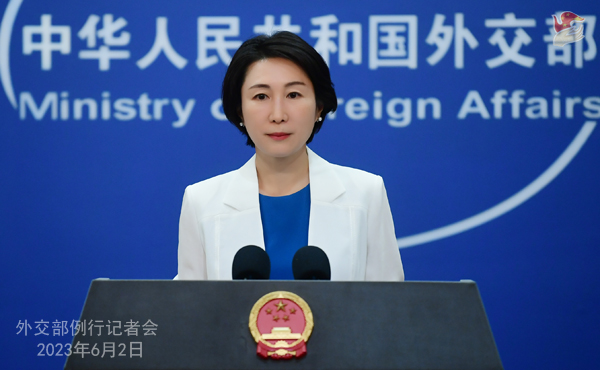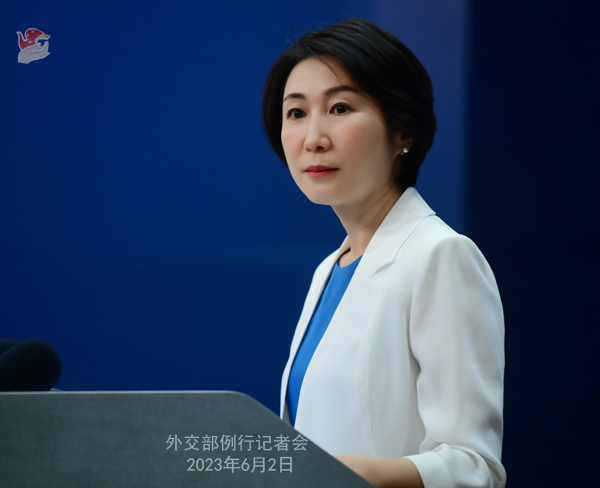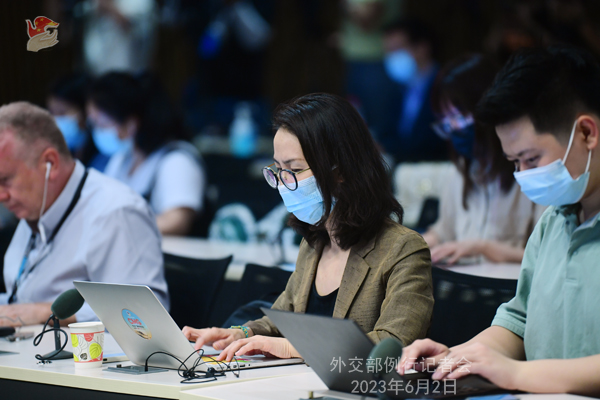| Foreign Ministry Spokesperson Mao Ning’s Regular Press Conference on June 2, 2023 |
| 2023-06-02 17:40 |
|
At the invitation of the government of the Republic of Türkiye, Ding Zhongli, President Xi Jinping’s special envoy and Vice Chairman of the Standing Committee of the National People’s Congress (NPC), will attend President Recep Tayyip Erdoğan’s inauguration ceremony in Ankara on June 3. CCTV: According to reports, the first agreement under the US-Taiwan Initiative on 21st Century Trade was signed in Washington D.C. on the evening of June 1. Does the foreign ministry have any comment? Mao Ning: China strongly opposes official interactions of any form between China’s Taiwan region and countries that have diplomatic relations with China. That includes negotiating or signing any agreement that implies sovereignty and has an official nature. The US government has deliberately pushed forward negotiations with the DPP authorities in Taiwan on the so-called “Initiative on 21st Century Trade” and signed the agreement. This gravely violates the one-China principle and the three China-US joint communiqués, and contravenes the US’s own commitment of maintaining only unofficial relations with Taiwan. China strongly deplores this and has made serious démarches to the US side. Under the disguise of trade cooperation, the so-called “Initiative” is just a US tool to rip Taiwan off. The DPP authorities, driven by the selfish separatist agenda, have no scruples to betray Taiwan compatriots and businesses’ interests or sell Taiwan away. By signing the agreement, they are offering Taiwan to the US on a plate. This is the latest example of the US trying to fudge and hollow out the one-China principle. We once again urge the US to abide by the one-China principle and the three China-US joint communiqués, immediately change course and stop official interactions of any form with Taiwan, stop pushing forward and revoke at once the so-called “Initiative” and agreement, and stop sending wrong signals to “Taiwan independence” separatist forces, otherwise all consequences shall be borne by the US side. People’s Daily: We noted that the foreign ministry recently announced on its website that overseas Chinese diplomatic missions will launch remote online notarization service globally starting from June 1. Can you elaborate on this? Mao Ning: Based on regulations stipulated in the Notarization Law of the People’s Republic of China, Vienna Convention on Consular Relations and bilateral consular treaties between China and other countries, Chinese diplomatic missions provide notarization service in accordance with law for Chinese nationals who have resided overseas for a long period. Given that overseas diplomatic missions could not directly notarize the disposition of real estate and other major assets and equity trade, individuals concerned had to spend time and money to travel back to China. To address the difficulties faced by overseas Chinese, the Ministry of Foreign Affairs and the Ministry of Justice jointly launched overseas remote online notarization service. According to this arrangement, after relevant Chinese notary institutions approved the application, overseas Chinese only have to go to the local Chinese embassies and consulates to complete the notarization process with notaries in China via video link witnessed by consular staff. Since the remote online notarization service was piloted in some countries starting from May last year, the service has met the urgent need of local Chinese and was widely welcomed by them. In order to lower costs, streamline the process and help more overseas Chinese benefit from the innovative service of “internet+consular”, 196 qualified Chinese diplomatic missions all over the world and nearly 300 notary institutions in China can provide remote online notarization service for overseas Chinese starting from June 1. Those who need the service can check back for the notice issued by Chinese embassies and consulates. The Ministry of Foreign Affairs, diplomatic missions together with the Ministry of Justice and relevant notary institutions will provide more quality service to meet the need of overseas Chinese nationals.
Reuters: JPMorgan CEO Jamie Dimon is visiting staff and clients in Taiwan today. Does the foreign ministry have any comment? Mao Ning: This is not a matter of foreign affairs. On the Taiwan question, China’s position is consistent and clear. CRI: IAEA Director General Rafael Mariano Grossi said on May 30 that the situation at the Zaporizhzhya Nuclear Power Plant (ZNPP) is extremely fragile and dangerous. He called on Russia and Ukraine to abide by the IAEA’s five principles and the IAEA experts will monitor that. Do you have any comment? Mao Ning: The continuing Ukraine crisis poses a grim challenge to the safety and security of Ukraine’s nuclear facilities. China takes this seriously and in China’s Position on the Political Settlement of the Ukraine Crisis issued in February this year, we call for keeping nuclear power plants safe and oppose armed attacks against nuclear power plants or other peaceful nuclear facilities. Following the common concerns of all parties, the IAEA Director General put forward a five-principle initiative to ensure the safety of the Zaporizhzhya Nuclear Power Plant (ZNPP) and has made active mediation efforts for this. China appreciates Director General Grossi’s effort and support the constructive role he and his organization have played in promoting the safety and security of nuclear facilities. We call on parties concerned to adhere to humanitarianism, be science-based and rational, stay in communication and cooperation, strictly abide by the Convention on Nuclear Safety and other relevant international law, avoid taking any action that might endanger nuclear facilities and do everything possible to avoid any unexpected situation. The ZNPP’s safety and security issue is just part of the Ukraine crisis and its settlement ultimately depends on the prospects of the political settlement of the Ukraine crisis itself. All parties should bear in mind the larger picture of peace and common security, work together to create enabling conditions for resuming talks and properly resolving relevant issues including the safety and security of the nuclear power plant. Countries with important influence should do more to play a responsible and constructive role rather than adding fuel to the fire. China will remain committed to promoting talks for peace and playing a constructive role in seeking a political settlement of the Ukraine crisis. Kyodo News: The Chinese Ministry of Commerce announced today that the RCEP entered into force for the Philippines, marking the full entry into force for all 15 member countries. But we have learned that RCEP is not yet implemented between some signatories including Japan and Myanmar. Analysts said that it was due to the domestic situation in Myanmar. What’s China’s comment? Mao Ning: RCEP is a major milestone in East Asian economic integration. The full entry into force of RCEP fully demonstrates that the 15 parties have taken practical steps to support the multilateral trading system, and are committed to continuously promoting a comprehensive, mutually beneficial and high-level economic partnership. China will work with all parties to implement RCEP well and inject more impetus for deepening regional economic integration and promoting growth in the region and the world as a whole. You mentioned that Japan and some other countries have not yet implemented RCEP and asked why, I think Japan is in a better position to answer this question.
|
 | ||||||||||||
 | ||||||||||||
|


